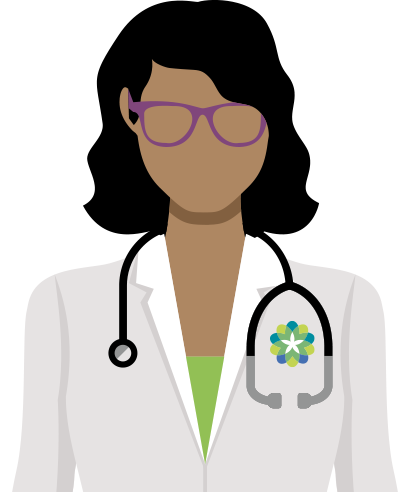|
Innovative program helps build a pipeline of medical assistants
(WILMINGTON, Del. – October 19, 2023)
To meet the growing demand amidst a national shortage of medical assistants, an innovative partnership between ChristianaCare and Delaware Technical Community College is enabling some ChristianaCare caregivers to receive training to become certified medical assistants while working for ChristianaCare.
 Downloadable Assets Downloadable Assets
Since 2021, the Medical Assistant Academy, formerly known as the Medical Assistant University, has graduated 18 medical assistants. The program, created by the ChristianaCare Medical Group, recently started its third cohort with 10 caregivers who will spend 180 hours in the classroom, followed by a 40-hour clinical internship within ChristianaCare primary care offices to help them hone their new skills.
Medical assistants work alongside physicians and perform clinical and administrative duties that are vital in a team-based care model. Medical assistants also frequently serve as a liaison between the patient and other members of the care team, ensuring that the patient receives clear communication and understands the plan of care.
“Medical Assistant Academy is an innovative program that is helping us to meet the needs for medical assistants in our practices,” said Cynthia Griffin, MS, BSN, RN, CPHQ, CCM, chief nursing officer of Community Care. “The program is a recruitment tool as well as a retention tool because it opens up a rewarding new career option for our caregivers. At the same time, by training and retaining more medical assistants, we’re improving access to care in our community.”
Innovative training for an increasingly in-demand profession
A growing demand for health care services, coupled with a changing workforce, has resulted in a shortage of medical assistants and other allied health workers across the country. The need for medical assistants is expected to grow 14% by 2032, nearly five times more than the national average for other occupations, according to the U.S. Bureau of Labor Statistics.
The Medical Assistant Academy focuses on attracting caregivers from roles that are not clinical — such as environmental services, telephone operators and patient escorts — but who might be interested in taking on a new challenge.
“We really want caregivers who already know our ChristianaCare values and culture,” said Laurie Domiano, BHA, CMA, medical assistant training and development manager for ChristianaCare. “It’s developing career opportunities for people who can’t work part-time and go to school or who don’t have the time to work 40 hours a week and then go to school at night and on the weekends, especially if they have a family.”
Nyre Tilghman was working as a patient care technician when she went back to school as part of a career change. Through the MA Academy, she continued to earn a paycheck while learning how to handle the myriad tasks required of medical assistants, including taking vital signs, drawing blood, giving immunizations, scheduling appointments and filling out insurance forms.
Tilghman passed the certified medical assistant exam through the American Association of Medical Assistants and joined ChristianaCare Primary Care at Darley Green in 2022. She is grateful to ChristianaCare for helping her take the career leap.
“I think that the Medical Assistant Academy is a great opportunity for employees looking for a career change,” Tilghman said. “It provided me with the chance to grow within the company instead of seeking the opportunity elsewhere. It also showed that ChristianaCare values and wants to support their employees’ development.”
Higher education institutions are increasingly working on ways to add to the health care workforce. Programs like the Medical Assistant Academy provide a valuable way to advance qualified employees through training that also helps them grow their career, said Jennifer Miller, BS, CMA, department chair of the medical assistant program at Delaware Technical Community College.
“For a lot of our students, they want to get their foot in the door, and Medical Assistant Academy is one way to do that,” Miller said.
Domiano said three caregivers from the previous two cohorts went back and completed their associate degree after finishing the medical assistant program.
 |
|
Need an expert source?
Our Experts, ChristianaCare's expert database, can help you find the right source for your next news story.
Request an interview ➜ |
|
About ChristianaCare
Headquartered in Wilmington, Delaware, ChristianaCare is one of the country’s most dynamic health care organizations, centered on improving health outcomes, making high-quality care more accessible and lowering health care costs. ChristianaCare includes an extensive network of primary care and outpatient services, home health care, urgent care centers, three hospitals (1,430 beds), a freestanding emergency department, a Level I trauma center and a Level III neonatal intensive care unit, a comprehensive stroke center and regional centers of excellence in heart and vascular care, cancer care and women’s health. It also includes the pioneering Gene Editing Institute.
ChristianaCare is nationally recognized as a great place to work, rated by Forbes as the 2nd best health system for diversity and inclusion, and the 29th best health system to work for in the United States, and by IDG Computerworld as one of the nation’s Best Places to Work in IT. ChristianaCare is rated by Healthgrades as one of America’s 50 Best Hospitals and continually ranked among the nation’s best by U.S. News & World Report, Newsweek and other national quality ratings. ChristianaCare is a nonprofit teaching health system with more than 260 residents and fellows. With its groundbreaking Center for Virtual Health and a focus on population health and value-based care, ChristianaCare is shaping the future of health care.
####
|